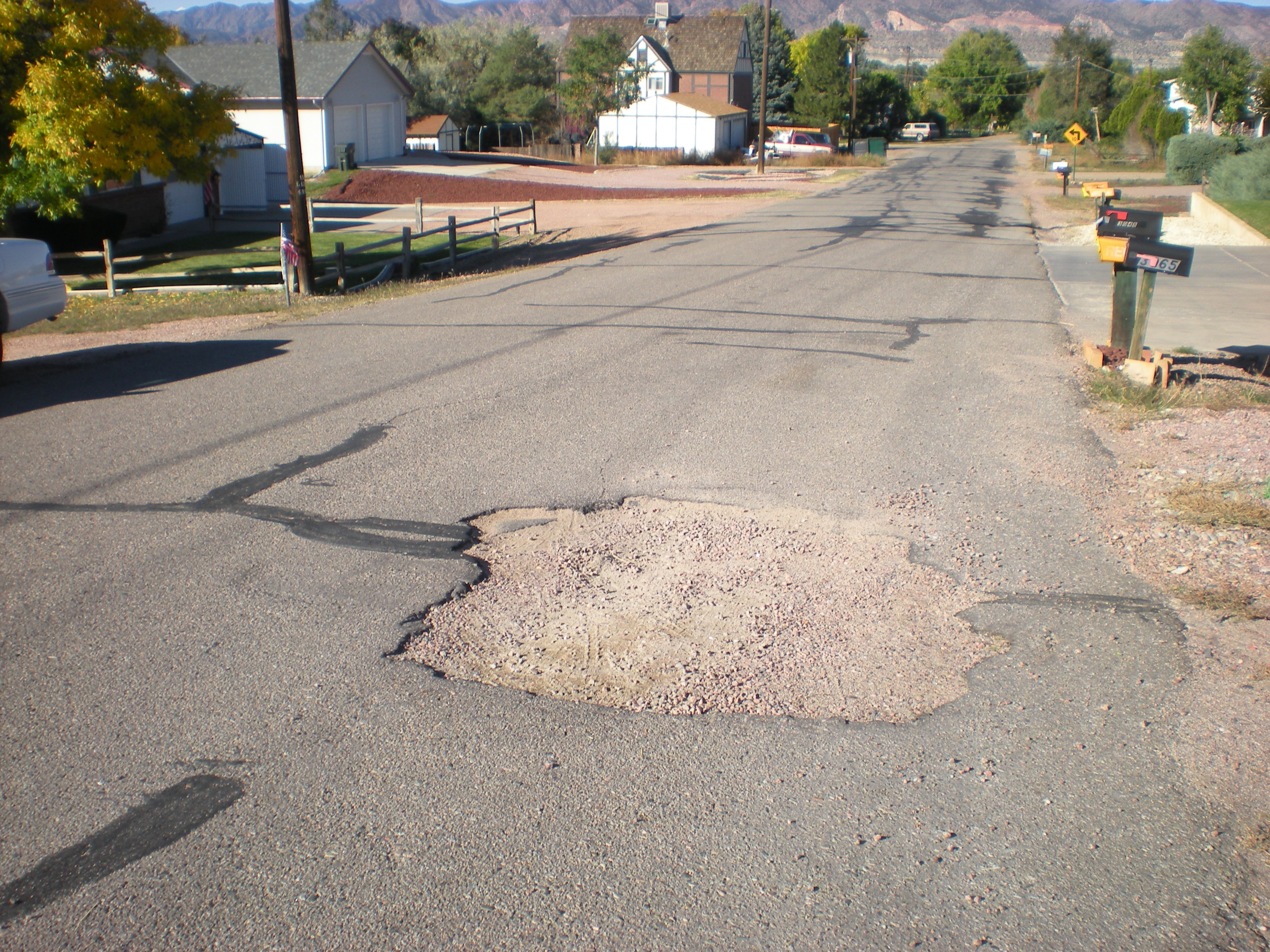
This street cut on Pear Avenue at the northwest edge of Canon City is an example of the street cuts that must meet new regulations for maintenance and repair
Confronted with utility cuts in county roads that in some cases have extended for two years, the Fremont County Commissioners adopted amendments to the county’s Street Cut Regulations at the urging of Department of Transportation Director Tony Adamic. Adamic proposed the amendment saying the utility cuts that have long been neglected by contractors, utility companies, or municipalities have ended up costing the county time, money, damaged roads, and repeated complaints from neighbors who drive over the roughed up street cuts. Adamic said there are currently eight street cuts open on county paved roads. He said one cut is now 15 months old and another is two years old that never secured a street cut permit to begin with.
The Commissioners conducted a public hearing at their October 8th regular meeting on the proposed amendment but even with direct contact with many of the contractors and agencies that make the street cuts, no one appeared to react to the tougher regulations.
The amended regulations make two significant changes. One deals with the fact that if weather conditions prevent the repair of a street cut on an asphalt street within the required 15 days after acceptance of the backfill by a county official, then the permittee would have to make a temporary repair with a patch of flowable fill. Previous regulations required a temporary fix with cold mix asphalt. The amendment also requires flowable fill to be permanently replaced with hot asphalt pavement within 30 days or as weather and availability of materials permit. In no event would replacement be allowed to go beyond six months from the temporary patch.
The other significant change imposes penalties on contractors who fail to adequately repair a county road street cut. Under the new language an excavator or contractor would be assessed a penalty of $5 per day for each day beyond the date the work should have been completed. Failure to pay costs, fees, or penalties or failure to complete the repair would result in revocation of any performance bond and denial of any future applications for street cut permits until full compliance is accomplished.
At the October 8th Board meeting Cotopaxi RE-3 School Superintendent Randy Bohlander and volunteer Donna Buss appeared to thank the Board of Commissioners for a $5,000 contribution from the county’s Conservation Trust Fund (lottery money) that will help install a new security system in the Cotopaxi School. Bohlander said the security system is estimated to cost about $18,000 but that they are just now preparing to go out to bid. He said Buss and other volunteers have raised $16,300 so far in the effort for which the school district did not have any other funds available to accomplish the project. District 3 Commissioner Ed Norden said county lottery funds are frequently used to assist other units of local government including $5,000 which went to the Town of Brookside for landscaping around their new town hall and $25,000 to the City of Cañon City to help complete the pedestrian trail to the Fremont Campus of Pueblo Community College.
In other business at the October 8th meeting:
- Approval of a Proclamation for 4-H Week in Fremont County from October 7th through October 13th;
- Approval of the holidays schedule for the 2014 county calendar;
- Chairman Debbie Bell announced that a public hearing would be scheduled at 10 a.m. on November 12th on a request by Pikes Peak Motor Company for a Commercial Development Plan just west of Penrose along Highway 50. The company proposes to use the former Loader Construction site as an automobile graveyard for storage of some 2,000 cars where they would be dismantled; parts sold, and cars restored. Owner Michael DeVriendt says he also plans to develop an upscale showroom to sell classic cars;
- District 3 Commissioner Ed Norden extended thanks to Colorado Correctional Industries which provided 8 new office chairs for the Commissioners meeting room under a loan program. Norden noted the chairs in the room have long needed to be replaced since they date back to when the building opened in the 1960’s.
